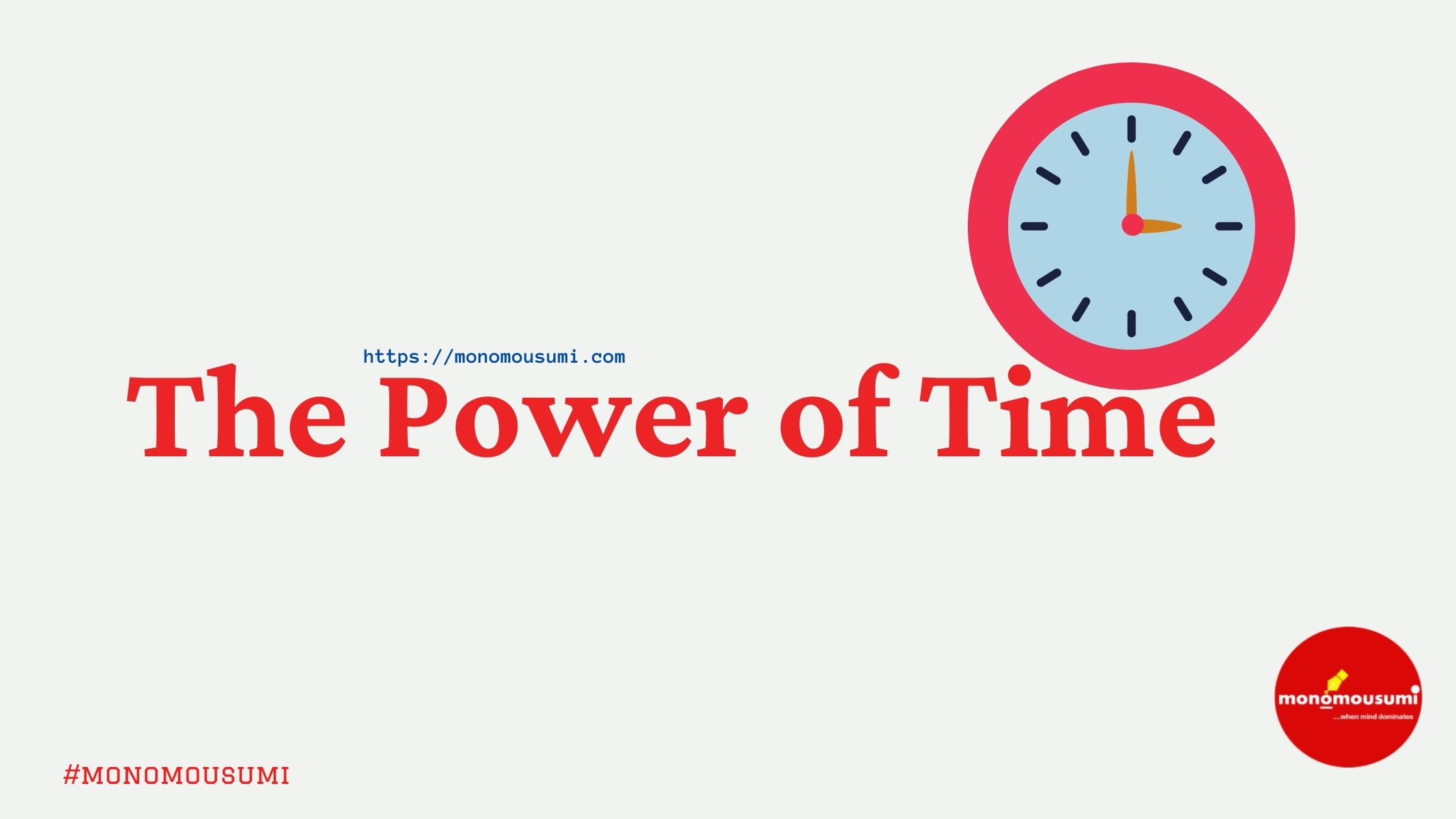
One invention that forever changed the way humans lived was the concept of time. As the saying goes, ‘Time waits for no man.’ Whether we wish times of worry would pass quicker or for time to slow during the joyous moments – time is inevitable, time is constant. Time is the indefinite continuation of events and existence from past to future (Time, 2011). If you think about it, time is what motivates us to get up in the morning. Some may argue that it is money or simply ‘living’. In reality – it is time we chase after. We pursue that dream or earn a living in order to build a future. The main reason we keep going is to make the most out of our time before the clock stops. Therefore, it is safe to say that the idea of time heavily influences our behaviour more than we realise. This essay will go in-depth about how exactly the awareness of time does that.
Before we uncover the power of time, we must first understand what time is. Approximately 13.7 billion years ago, the Big Bang gave birth to what we know as the universe, or space. Before that, every single particle of matter was packed into a single dot. That tiny dot contained matter that eventually became the Sun, the Earth, and the moon. The presence of these heavenly bodies made it possible for us to discover the passing of time. (University of Helsinki, 2005) In reference to Oxford Dictionaries, time is defined as the infinite progression of existence and events that occur irreversibly from the past, to the present, and into the future. Most believe that time exists as a fourth dimension, along with width, breadth, and height as the three spatial dimensions (Davies, 1996). Time is also one of the seven base quantities in the International System of Units (SI), with its SI base unit as the second. As time is a base quantity, it can be used to derive other quantities such as velocity.
For most of history, ordinary people did not have regular and easy access to any kind of time measuring device, other than glancing at the sky on a sunny day and seeing where the sun was. For them, the concept of time as we understand it today did not really exist. (Devlin, 1999) Fortunately, mankind’s extraordinary efforts to tell time have helped drive the evolution of timekeeping technology throughout history. About 5,000 years ago, the ancient Egyptians, Greeks and Romans needed to gauge the divisions of day and night to grow their civilizations. So, they created time. Well specifically, they created sundials, water clocks, the hourglass, and other early chronometric tools (Rogers, 2011) to make its existence known. (Andrews, 2006) According to archaeological evidence, the Babylonians and Egyptians created calendars particularly to regulate cycles of planting and harvesting, but to also schedule the shipment of goods, and to coordinate communal activities and public events (Richards, 1999). They based their calendars on three natural cycles: the solar day, marked by the periods of light and darkness brought about by the rotation of Earth on its axis; the lunar month, following the cycles of the moon as it orbits the earth; and the solar year, characterised by the changing seasons that accompany our planet’s revolution around the Sun. (Andrews, 2006)
In physics, time is a physical phenomenon. In psychology, however, time is essentially our sense of passing time. This awareness can do many things for us. It can promote self-improvement, motivate us to do something, or the exact opposite. To prove that the awareness of time profoundly affects us, statistics show that 34% of people feel rushed all the time, with 61% never having any excess time and 40% saying that time is a larger issue to them than money (Boniwell, 2008). Well, this is because we know that there are only 24 hours in a day, hence we feel compelled to maximise our time before the day ends. Shall we fail to accomplish the tasks we set out to do within that time frame, we may start to feel stressed. This is also particularly evident in students and the working class. Chronic stress from dealing with innumerable never-ending deadlines or the pressure to complete exam questions quickly puts a strain on their mental health. Until physical health starts suffering too, bit by bit. Not to mention that nowadays, time is money. Manufacturers that offer the fastest production times gain more clients. Businesses that provide the fastest services are more successful. On top of that, the expression is especially important in the fast fashion industry, for instance. Clothing brands such as H&M are beating out retailers with their constant flow of new and trendy products, encouraging customers to frequent their stores more often, which means more profits for the company (Hayes, 2020).
However, without the perception of time, we would have done anything for however long we wanted to. The term ‘efficient’ would cease to exist. No doubt delaying evolutionary progress and setting us back for years, if not, decades. In fact, the lack of time is such an alien concept because ever since the Big Bang, everything in the universe has been in a continuous state of change (Shillito, 2017). Such as if a butterfly flaps its wings in Tokyo, a tornado occurs in Tennessee – the butterfly effect. With all that said, instead of fearing time, we should learn to manage it properly by figuring out how we analyse time.
Your ‘Time Perspective’ (TP) are a pair of glasses that you habitually put on when you look at the world and yourself in it. Fundamentally, we look at time through the lenses of past, present, and future. Believe it or not, the paradox of time perspective heavily influences many aspects of our behaviour, such as academic achievement, romantic partner choices, health, sleep, and many more. (Boniwell, 2008) After all, “The way we orient toward the past, present and future are key to happiness and success” said psychologist Philip Zimbardo (2009), the creator of the TP concept. Specifically, there are five main types of time perspective, namely:
1. Future,
2. Past-Negative,
3. Past-Positive,
4. Present-Hedonistic, and
5. Present-Fatalistic.
Someone who is predominantly future-oriented is always concerned with anticipated consequences, often conducts ‘cost-benefit analysis’ and usually avoids time-wasting temptations. (Zimbardo, 2009) In other words, they tend to be more patient and make decisions based on their desired future outcome. Founder and CEO of Amazon, Jeff Bezos, are among those people. In the early startup days, Amazon was earning profits near $0 or below for several years. (Fundable, n.d.) Despite those staggering numbers, Bezos continued to persevere and focused on long-term growth instead. By 2020, Amazon made a net income of $6.3 billion (Protalinski, 2020). What can I say? You reap what you sow. Additionally, the Past TP is associated with a focus on memories. This can be either positive or negative. Past-Positive people have a pleasurable and sentimental view of their past. They live by the words ‘Time has a wonderful way of showing us what really matters’. They love stories about the glory days. On the contrary, the Past-Negative feel haunted by their past, with an emphasized focus on aversive or unpleasant experiences. However, a Present-Hedonistic person focuses on the immediate situation and makes decisions based on their present emotions. Commonly, children are primarily present-hedonistically oriented. On the other hand, Present-Fatalistic TP believes that their life is controlled by outside forces such as spiritual or government forces. (Boniwell, 2008)
According to Zimbardo (2009), your TP can become biased, because you tend to over-use some of them and under-use others. Ideally, we should strive for a balanced time perspective as it is a proposedly better alternative to living life as a slave to any particular temporal bias. (Boniwell & Zimbardo, 2004; Boyd & Zimbardo, 2005) The well-known psychologist suggests that we blend and flexibly engage the past, present and future components depending on a situation’s demands, as well as our needs and core values. (Zimbardo, 2002, p. 62)
In conclusion, although the digits on our devices that we refer to from time to time may seem small and insignificant, they have brought a sense of meaning and structure to our lives. Time also has a way of making life’s moments even more precious and meaningful because once time passes, it will never come back. Without time, we would not be able to enjoy or witness the evolution of technology that helped build great civilizations like ancient Egypt from the ground up. So, be more aware of time, use it wisely. As the great Steve Jobs once said, “Your time is limited, so don’t waste it living someone else’s life”.
By Bridget Yeo, Malaysia (Sabah)


